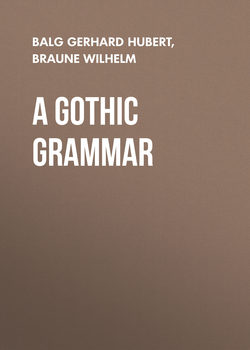Читать книгу A Gothic Grammar - Braune Wilhelm - Страница 7
FONOLOGY
CHAP. II. THE VOWELS
u
Оглавление§ 13. The letter u in Gothic denotes both a short and a long vowel; the short u, however, occurs oftener than long û.
Note 1. u in foren words regularly represents Gr. ου. In unaccented syllabls, however, it stands for Gr. ο: diabulus, διάβολος (beside diabaúlus), apaústulus (beside apaústaúlus), paíntêkustê, πεντηκοστή.
Note 2. u for ô seldom (§ 12, n. 1), u for áu (§ 25, n. 3).
§ 14. Short u is very frequent in Gothic. E. g.
(a) juk, yoke; sunus, sun; drus, fall; us-drusts, a falling; fra-lusts, lost; lusnan, to perish; – in the prt. pl. and pp. of the verbs of the II. series (§ 31); e. g., gutum, gutans; lusum, lusans; – in endings of the sbs. of the u-decl.: handus, handu; – final, as in þu, prn., thou; nu, now; -u (interr. particl).
(b) wulfs, wolf; wulla, wool; gaqumþs, council; gulþ, gold; swumfsl, pond; hund, 100; sibun, 7; taíhun, 10; fulls, ful; un- (privativ prefix); in the prt. pl. and pp. of the verbs of the III. series (§ 32): bundum, bundans; in the pp. of the verbs of the IV. series (§ 33): numans, stulans.
brukans, broken; us-bruknan, to break off (intr.); trudan, to tred, pp. trudans; snutrs, wise.
Note 1. As a rule, the final u of stems is dropt before derivativ j-suffixes; e. g., -hardjan, to harden (< hardus); -agljan, to trubl (< aglus); manwjan, to prepare (< manwus); ufarassjan, to increase (< ufarassus); L. Meyer, 'Got. Spr.', p. 325 et seq. But skadwjan, to overshadow (< skadus), and skadweins, a shading (cp. Zs. fda. 36, 269). – Concerning u beside w, cp. § 42.
Note 2. Every u before h and r is broken to aú; cp. § 24.
Note 3. u is eight times (mostly in Lu.) represented by o; e. g., laúhmoni, lightning: Lu. XVII, 24; sunjos, suns; Lu. XVI, 8; ushôfon; Lu. XVII, 13; ainomêhun; Lu. VIII, 43; faího, muney; Mk. X, 23.
Note 4. In the endings of the u-declension u is occasionally represented by au; as, sunaus (nom. sg.); Lu. IV, 3; cp. § 105, n. 2.
§ 15. Long û certainly appears in: (a) ût, out (ûta, etc.); dûbô, duv; rûna, mystery; rûms, room, roomy; *mûl (in faúrmûljan, to muzl); brûþs, bride; hûs, house; skûra, shower; hlûtrs, pure; fûls, foul; *mûks (in mûkamôdei), meek; þûsundi, 1000; brûkjan, to uze (prt. brûhta; adj. brûks); lûkan, to lock (§ 173, n. 2); hrûkjan, to crow (s. Beitr., 6, 379); hnûþô, sting (Icel. hnúþa; s. Noreen, Nord. revy, April 1883).
(b) for nasalized u, the primitiv nasal being lost (cp. § 5, b; § 50, n. 1): þûhta (prt. of þugkjan, to think), þûhtus, thought (adj. þûhts); hûhrus, hunger; jûhiza (compar. to juggs), yunger; ûhtwô, daybreak; ûhteigs, ûhtiugs, seasonabl; bi-ûhts, accustomd (s. Brgm., I, 181).
Note 1. u is perhaps long in: þrûtsfill, leprosy (cp. ON. þrútinn, swoln; OE. þrûstfell; Beitr., 9, 254); anabûsns, commandment (Beitr., 9, 152 and 10, 497; Brgm., II, 287); lûns, ransom (Brgm., II, 285); sûts, sweet (OS. swôti, OE. swête; cp. however Kuhn's Zs., 26, 380); the suff. -dûþs (§ 103; cp. Beitr. 6, 380); jûs, ye (§ 150; Brgm., III, 374. 398). Sum write also fidûr- and -ûh (cp. § 24, n. 2).
Note 2. In Rûma, Rome, Rûmôneis, a Roman, û stands for the Lt. o.
Note 3. o for û occurs only in ôhteigô; II. Tim. IV, 2 (in codex B, for ûhteigô in A).
Note 4. For û becuming au before vowels, s. § 26, b.
